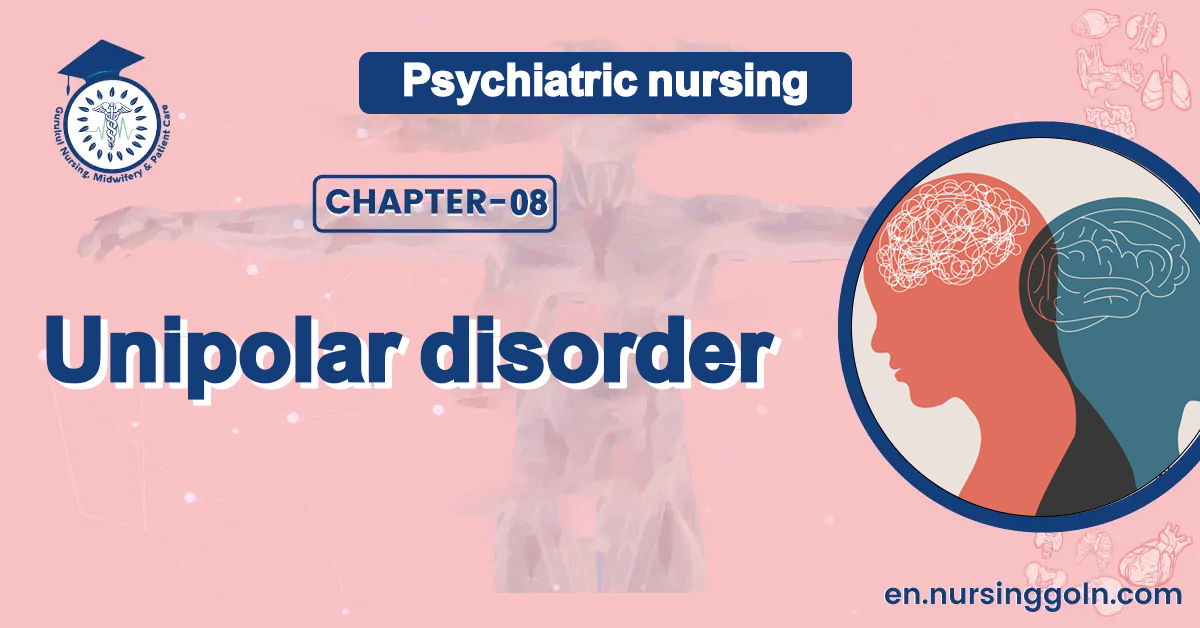Unipolar disorder – This book covers the entire syllabus of “Psychiatric Nursing” prescribed by the Universities of Bangladesh- for Basic and diploma nursing students. We tried to accommodate the latest information and topics. This book is an examination-friendly setup according to the teachers’ lectures and examination questions.
At the end of the book previous university questions are given. We hope in touch with the book students’ knowledge will be upgraded and flourish. The unique way of presentation may make your reading of the book a pleasurable experience.

Unipolar disorder
Unipolar disorders are major depressive disorder and dysthymic disorder.
Causes of unipolar disorders
It’s not known exactly what causes depression. As with many mental disorders, a variety of factors may be involved, such as:
- Biological differences. People with depression appear to have physical changes in their brains. The significance of these changes is still uncertain, but may eventually help pinpoint causes.
- Brain chemistry. Neurotransmitters are naturally occurring brain chemicals that likely play a role in depression. Recent research indicates that changes in the function and effect of these neurotransmitters and how they interact with neurocircuits involved in maintaining mood stability may play a significant role in depression and its treatment.
- Hormones. Changes in the body’s balance of hormones may be involved in causing or triggering depression. Hormone changes can result with pregnancy and during the weeks or months after delivery (postpartum) and from thyroid problems, menopause or a number of other conditions.
- Inherited traits. Depression is more common in people whose blood relatives also have this condition. Researchers are trying to find genes that may be involved in causing depression.
Risk factors:
Depression often begins in the teens, 20s or 30s, but it can happen at any age. More women than men are diagnosed with depression, but this may be due in part because women are more likely to seek treatment. Factors that seem to increase the risk of developing or triggering depression include:
- Certain personality traits, such as low self-esteem and being too dependent, self-critical or pessimistic
- Traumatic or stressful events, such as physical or sexual abuse, the death or loss of a loved one, a difficult relationship, or financial problems
- Blood relatives with a history of depression, bipolar disorder, alcoholism or suicide
- Being lesbian, gay, bisexual or transgender, or having variations in the development of genital organs that aren’t clearly male or female (intersex) in an unsupportive situation
- History of other mental health disorders, such as anxiety disorder, eating disorders or post-traumatic stress disorder
- Abuse of alcohol or recreational drugs
- Serious or chronic illness, including cancer, stroke, chronic pain or heart disease
- Certain medications, such as some high blood pressure medications or sleeping pills (talk to your doctor before stopping any medication)

Signs and symptoms of unipolar depression:
1. Persistent sadness lasting greater than 2 weeks.
2. Loss of interest or pleasure in activities that were once enjoyed (including sex).
3. Loss of appetite or weight loss, or overeating and weight gain.
4. Sleep disturbances
5. Energy loss or fatigue.
6. Behaviour that is either slowed down or restless.
7. Feelings of worthlessness, hopelessness, and pessimism.
8. Difficulty concentrating, making decisions and remembering.
9. Thoughts of death or suicide.
10. In some culture, physical discomfort, weakness, and “nerves” may be the most prominent symptoms.
11. In children and adolescents, mood is more likely to be in table.
12. If depression is quite severe, it may be accompanied by psychiatric symptoms, such as hallucinations and delusions. These are usually consistent with the depressed mood, and may focus on themes of guilt personal inadequacy, or disease.
13. Depression can also appear as irritability, anger, and discouragement rather than feelings of hopelessness and helplessness.
[Ref-Maya George/2d/194-5/]
Complications:
Depression is a serious disorder that can take a terrible toll on you and your family. Depression often gets worse if it isn’t treated, resulting in emotional, behavioral and health problems that affect every area of your life.
Examples of complications associated with depression include:
- Excess weight or obesity, which can lead to heart disease and diabetes
- Pain or physical illness
- Alcohol or drug misuse
- Anxiety, panic disorder or social phobia
- Family conflicts, relationship difficulties, and work or school problems
- Social isolation
- Suicidal feelings, suicide attempts or suicide
- Self-mutilation, such as cutting
- Premature death from medical conditions

Prevention
There’s no sure way to prevent depression. However, these strategies may help.
- Take steps to control stress, to increase your resilience and boost your self-esteem
- Reach out to family and friends, especially in times of crisis, to help you weather rough spells.
- Get treatment at the earliest sign of a problem to help prevent depression from worsening.
- Consider getting long-term maintenance treatment to help prevent a relapse of symptoms
